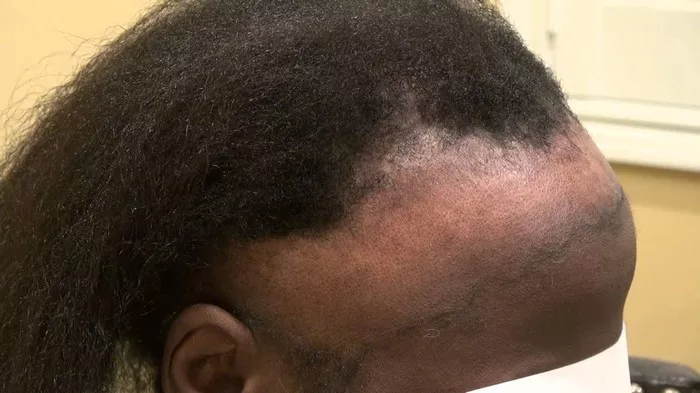Hair loss can be a distressing concern for many individuals, impacting not only physical appearance but also emotional well-being. While various factors contribute to hair loss, protein deficiency is a significant player in this intricate equation. In this comprehensive guide, we will explore the intricate relationship between protein deficiency and hair loss, shedding light on the importance of adequate protein intake for maintaining a healthy and vibrant mane.
Understanding the Role of Proteins in Hair Health
Before delving into the specific proteins associated with hair loss, it’s essential to grasp the fundamental role proteins play in maintaining hair health. Hair is primarily composed of a protein called keratin, and adequate protein intake is crucial for the growth, strength, and structure of each hair strand. Proteins provide the building blocks necessary for the formation of hair follicles, and their absence or insufficiency can lead to a range of hair-related issues, including hair loss.
1. Keratin: The Foundation of Healthy Hair
Keratin, a fibrous structural protein, serves as the foundation of hair structure. It forms the outer layer of the hair shaft, providing strength, elasticity, and resilience. When the body lacks sufficient protein, the production of keratin is compromised, leading to weakened hair that is prone to breakage and loss.
2. Collagen: A Supportive Matrix for Hair Follicles
Collagen, another vital protein, acts as a supportive matrix for hair follicles. It plays a role in maintaining the integrity of the hair bulb and surrounding connective tissues. In cases of protein deficiency, collagen production may be impaired, potentially impacting the health and vitality of hair follicles, resulting in hair thinning and shedding.
3. Essential Amino Acids: The Building Blocks of Proteins
Proteins are composed of amino acids, and certain amino acids are deemed essential because the body cannot produce them on its own – they must be obtained through diet. Methionine, lysine, and cysteine are amino acids crucial for hair health. A deficiency in these essential amino acids can disrupt the synthesis of keratin and other proteins necessary for robust hair growth.
See Also: Unlocking the Connection: Which vitamin deficiency causes hair loss
Identifying Protein Deficiency-Related Hair Loss: Telogen Effluvium
Telogen effluvium is a type of hair loss associated with inadequate protein intake. This condition occurs when a significant number of hair follicles enter the resting phase (telogen) prematurely, leading to excessive shedding. Protein deficiency can disrupt the normal hair growth cycle, pushing a large number of hairs into the telogen phase simultaneously.
Addressing Protein Deficiency-Related Hair Loss: Dietary Solutions
If you suspect that protein deficiency is contributing to your hair loss, addressing it through dietary adjustments is a proactive step. Incorporate protein-rich foods into your daily meals, such as lean meats, fish, eggs, dairy products, legumes, and nuts. Consider consulting with a nutritionist to ensure you are meeting your specific protein needs based on your age, gender, and overall health.
1. Lean Meats and Fish: A Protein Powerhouse
Lean meats and fish are excellent sources of high-quality protein. Opt for poultry, lean cuts of beef, salmon, and other fish rich in omega-3 fatty acids. These proteins not only contribute to hair health but also provide essential nutrients that support overall well-being.
2. Eggs: Nature’s Protein Package
Eggs are a complete protein source, containing all essential amino acids. They also provide biotin, a B-vitamin crucial for hair health. Incorporating eggs into your diet can contribute to the protein and nutrient balance necessary for promoting robust hair growth.
3. Dairy Products: Calcium and Protein Combo
Dairy products like yogurt and cheese offer a combination of protein and calcium. Calcium is essential for hair follicle health, and when paired with protein, it enhances the overall strength and structure of your hair.
4. Plant-Based Proteins: Legumes and Nuts
For individuals following a vegetarian or vegan diet, plant-based sources of protein become crucial. Legumes, such as lentils and beans, and nuts, like almonds and walnuts, are rich in protein and also provide essential vitamins and minerals that support healthy hair growth.
Supplementing with Protein for Hair Health
In certain cases, dietary adjustments alone may not be sufficient to address protein deficiency-related hair loss. Protein supplements, when used under the guidance of a healthcare professional, can provide a concentrated source of essential amino acids and nutrients crucial for hair health.
Maintaining a Holistic Approach to Hair Care
While addressing protein deficiency is vital for combating hair loss, maintaining a holistic approach to hair care is equally important. Ensure that your diet includes a variety of nutrients, such as vitamins and minerals, that support overall hair health. Stay hydrated, manage stress levels, and adopt a gentle hair care routine to minimize factors that contribute to hair loss.
Conclusion: Nourishing Your Hair from Within
In the intricate dance of hair health, protein deficiency emerges as a significant player in the realm of hair loss. Understanding the role of proteins, amino acids, and essential nutrients in maintaining healthy hair provides a roadmap for addressing and preventing protein deficiency-related hair loss. By adopting a balanced diet, considering supplements when necessary, and embracing a holistic approach to hair care, you empower yourself to nourish your hair from within and cultivate a vibrant, resilient mane.


